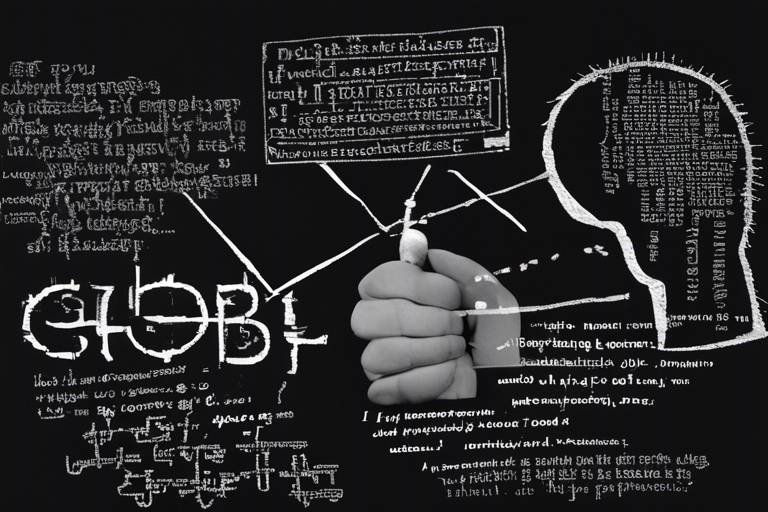Philosophy in Meteorology - Predicting the Unpredictable
Weather has fascinated humanity for centuries, and the quest to understand and predict it has led to a fascinating intersection of philosophy and meteorology. At first glance, these two fields may seem worlds apart. However, when we dig deeper, we uncover a rich tapestry of ideas that can enhance our understanding of weather phenomena and the inherent uncertainties that come with forecasting. So, what exactly does philosophy have to do with meteorology? Well, it turns out that philosophical principles can guide us in navigating the complexities of predicting the unpredictable.
Consider this: when meteorologists forecast the weather, they are not merely crunching numbers or analyzing data; they are engaging in a form of epistemological inquiry. They are asking questions about what we know, how we know it, and the limitations of that knowledge. This philosophical lens allows us to appreciate that weather forecasting is not just a scientific endeavor but also a deeply philosophical one. It challenges us to reflect on the nature of prediction itself, the reliability of our models, and the implications of uncertainty in our forecasts.
Moreover, the unpredictable nature of weather systems can be likened to a complex puzzle. Each piece—be it temperature, humidity, wind speed, or atmospheric pressure—interacts in ways that are often chaotic and non-linear. This is where chaos theory comes into play, illustrating how small changes in initial conditions can lead to vastly different outcomes. It’s a bit like trying to predict the path of a butterfly's wings—one flap can change everything. Through this lens, we can begin to appreciate the philosophical ramifications of uncertainty in our weather predictions.
As we explore the philosophical underpinnings of meteorology, we also recognize the ethical dimensions of weather forecasting. Meteorologists hold a significant responsibility: they must communicate risks effectively to the public while navigating the uncertainties inherent in their predictions. This brings us to the crucial relationship between public trust and effective communication strategies. How can meteorologists convey the complexities of their forecasts without causing panic or complacency? This question not only has practical implications but also philosophical ones, as it challenges us to consider the ethics of information dissemination in the face of uncertainty.
In summary, the interplay between philosophy and meteorology opens up a rich dialogue about prediction, knowledge, and ethics. It encourages us to think critically about how we understand and communicate the unpredictable nature of our weather systems. As we delve deeper into this fascinating intersection, we will uncover how philosophical inquiry can enhance our approach to meteorology, ultimately leading to more informed and responsible forecasting practices.
- How does philosophy influence meteorology? Philosophy helps us understand the nature of prediction, the limitations of knowledge, and the ethical responsibilities of meteorologists.
- What is chaos theory, and why is it important in weather forecasting? Chaos theory explains how small changes in initial conditions can lead to vastly different outcomes, emphasizing the unpredictability of weather systems.
- Why is effective communication important in meteorology? Effective communication builds public trust and ensures that people understand the risks associated with weather forecasts.
- What ethical considerations do meteorologists face? Meteorologists must balance the need to inform the public about weather risks while acknowledging the uncertainties in their predictions.

The Nature of Prediction
When we think about prediction, especially in the realm of meteorology, it often conjures up images of weather reports that tell us whether to carry an umbrella or wear sunglasses. But prediction is so much more than just a simple yes or no answer. It’s a complex interplay of data, models, and, interestingly, philosophical inquiry. At its core, prediction in meteorology is about understanding and interpreting the chaotic and often unpredictable nature of weather systems. Have you ever wondered why a forecast can change dramatically from one day to the next? This unpredictability stems from the inherent complexities of the atmosphere, where countless variables interact in ways that can be difficult to foresee.
Philosophically speaking, the act of predicting weather is akin to peering into a foggy crystal ball. We rely on scientific models, which are essentially educated guesses based on current knowledge and historical data, but these models are limited by our understanding of the natural world. The limitations of these predictions are not just technical; they also raise important questions about knowledge and certainty. How do we know what we know about the weather? What constitutes reliable knowledge in a field that seems to dance on the edge of chaos?
One of the key challenges in meteorology is that weather is a complex system. This means that small changes in initial conditions can lead to vastly different outcomes, a concept famously illustrated by the butterfly effect. For example, the flapping of a butterfly's wings in Brazil could theoretically set off a tornado in Texas. This unpredictability is not just a nuisance; it fundamentally shapes how we approach forecasting. Meteorologists must grapple with the fact that their predictions are often accompanied by a degree of uncertainty. This uncertainty can be quantified, but it can never be completely eliminated, which leads to a fascinating philosophical dilemma: how do we communicate these uncertainties to the public effectively?
To better understand the nature of prediction in meteorology, we can categorize the types of predictions made into several key areas:
- Short-term forecasts: These predictions typically cover a few hours to a few days ahead and are generally more accurate due to the limited time frame.
- Medium-term forecasts: These span several days to a couple of weeks and introduce more uncertainty as the time frame extends.
- Long-term forecasts: These can cover months or even years and are the most uncertain, often relying on broader climatic patterns rather than specific weather events.
Each of these categories presents unique challenges and philosophical questions. For instance, how should we weigh the importance of a short-term forecast versus a long-term climate prediction? Should we prioritize immediate safety over long-term planning? These considerations not only affect meteorologists but also impact policymakers, businesses, and everyday citizens who rely on weather predictions to make informed decisions.
In conclusion, the nature of prediction in meteorology is a rich tapestry woven from threads of science, philosophy, and human experience. It invites us to ponder the limits of our knowledge and the responsibilities that come with it. As we continue to refine our forecasting methods, we must also engage with the philosophical implications of what it means to predict the unpredictable. So, the next time you check the weather, remember: it’s not just about the forecast; it’s about the fascinating interplay of knowledge, uncertainty, and human understanding.

Epistemology and Weather Forecasting
When we think about epistemology, we're diving into the deep waters of knowledge—how we know what we know. In the realm of meteorology, this becomes particularly fascinating. Weather forecasting is not just about predicting rain or shine; it’s about understanding the very fabric of our reality and how we interpret the information available to us. Imagine trying to predict the behavior of a flock of birds; it’s a complex system influenced by numerous variables. Similarly, weather patterns are intricate and often chaotic, making the task of forecasting a true intellectual challenge.
At its core, epistemology in weather forecasting revolves around three main pillars: acquisition, validation, and utilization of information. Each of these components plays a critical role in how meteorologists create their forecasts. First, we acquire data from various sources, including satellites, weather stations, and radar systems. This data is not just random numbers; it tells a story about the atmosphere's current state. But here’s the kicker: how do we know that the data we collect is accurate? This is where validation comes in. Meteorologists must rigorously test and verify their data against known standards and historical records to ensure reliability.
Once we have validated our data, the next step is utilization. This is where the real magic happens. Meteorologists apply sophisticated models and algorithms to interpret the data, translating it into forecasts. But it’s not as straightforward as it sounds. The models themselves are based on assumptions and simplifications of complex atmospheric processes, which can lead to uncertainties. This is a crucial point: the very nature of weather forecasting is laden with epistemological challenges. It’s a dance between certainty and uncertainty, where meteorologists must navigate the murky waters of incomplete knowledge.
Let’s consider an example to illustrate this. Imagine a weather model predicting a storm. The model might indicate a 70% chance of rain, but what does that really mean? It suggests that, based on current data and historical patterns, there’s a high likelihood of rain, but it doesn’t guarantee it. This uncertainty is a reflection of the limitations of our knowledge and the chaotic nature of the atmosphere. Just as a philosopher might ponder the nature of existence, meteorologists must grapple with the epistemic limits of their predictions.
Moreover, the philosophical implications of how we interpret and communicate this uncertainty to the public are profound. When meteorologists say there's a 30% chance of rain, that statement carries weight—not just in terms of planning a picnic, but also in how people perceive risk and make decisions. This brings us to the ethical dimensions of weather forecasting, which we’ll explore further in the next section.
In summary, the intersection of epistemology and weather forecasting is a rich field of inquiry that challenges our understanding of knowledge itself. It compels us to ask: How do we know what we know about the weather? And, perhaps more importantly, how do we communicate that knowledge in a way that is both responsible and enlightening?
- What is epistemology? Epistemology is the study of knowledge—how we acquire, validate, and utilize information.
- Why is epistemology important in meteorology? It helps meteorologists understand the limitations and uncertainties in their predictions, guiding them in how to communicate these to the public.
- How does uncertainty affect weather forecasting? Uncertainty is inherent in weather forecasting due to the chaotic nature of the atmosphere, which can lead to varying outcomes even with similar initial conditions.
- How do meteorologists validate their data? Meteorologists validate data by comparing it against historical records and using established standards to ensure accuracy.

Scientific Method in Meteorology
The scientific method serves as the backbone of meteorology, providing a structured approach to understanding the complexities of weather phenomena. At its core, the scientific method is a cyclic process that begins with observation, followed by the formulation of a hypothesis, experimentation, and finally, the analysis of data to draw conclusions. This method is crucial in meteorology, where the atmosphere is a dynamic and multifaceted system. By applying this method, meteorologists can develop predictive models that attempt to make sense of the chaotic nature of weather.
One of the most fascinating aspects of the scientific method in meteorology is the way it intertwines with philosophical principles. For instance, when meteorologists observe a weather pattern, they are not merely recording data; they are engaging in a philosophical inquiry about the nature of that pattern. This inquiry leads to the formulation of hypotheses. For example, if a meteorologist observes that a cold front is moving into a region, they might hypothesize that this will lead to a drop in temperature and an increase in precipitation. This hypothesis is then tested through data collection and analysis.
Moreover, the scientific method encourages a culture of skepticism and verification. Meteorologists must constantly question their assumptions and the validity of their data. This is where the philosophical concept of epistemology comes into play. Epistemology, the study of knowledge and justified belief, prompts meteorologists to ask: How do we know what we know about the weather? This question is vital, as it drives the continuous refinement of forecasting models and techniques.
To illustrate the scientific method's application in meteorology, consider the following table that outlines the key steps involved:
| Step | Description |
|---|---|
| Observation | Gathering data from various sources, such as satellite imagery and weather stations. |
| Hypothesis Formation | Formulating a testable prediction based on the observed data. |
| Experimentation | Conducting simulations or collecting further data to test the hypothesis. |
| Analysis | Interpreting the results to determine if the hypothesis is supported or refuted. |
| Conclusion | Drawing conclusions and refining the hypothesis for future tests. |
This structured approach not only enhances our understanding of weather but also highlights the inherent uncertainties involved. Meteorologists must grapple with the limitations of their models, acknowledging that while they can forecast weather patterns with some degree of accuracy, the chaotic nature of the atmosphere often leads to unexpected outcomes. This unpredictability is a significant philosophical consideration in meteorology, as it challenges the very notion of certainty in scientific predictions.
In conclusion, the scientific method is more than just a series of steps; it is a philosophical framework that guides meteorologists in their quest to predict weather phenomena. By embracing both the scientific rigor and the philosophical inquiry inherent in this method, meteorologists can navigate the unpredictable nature of the atmosphere and improve their forecasting abilities.
- What is the scientific method? The scientific method is a systematic approach to research and experimentation that involves observation, hypothesis formation, experimentation, analysis, and conclusion.
- How does the scientific method apply to meteorology? In meteorology, the scientific method helps meteorologists observe weather patterns, formulate hypotheses about future weather, test these hypotheses through data collection and analysis, and refine their predictive models.
- Why is uncertainty important in weather forecasting? Uncertainty is a crucial aspect of weather forecasting because the atmosphere is a complex and chaotic system, making precise predictions challenging.

Hypothesis Formation
In the realm of meteorology, the process of serves as a crucial stepping stone toward understanding and predicting weather phenomena. Just like a detective piecing together clues from a crime scene, meteorologists formulate hypotheses based on observations and data. This process is not only scientific but also deeply philosophical, as it involves asking the right questions and challenging existing knowledge. How do we know what we think we know about the weather? What assumptions are we making when we predict a storm? These questions highlight the interplay between philosophy and science in the quest for meteorological understanding.
A hypothesis in meteorology is essentially a testable statement that can explain a weather-related phenomenon. For instance, a meteorologist might hypothesize that "increased ocean temperatures lead to more intense hurricanes." This hypothesis is rooted in both empirical data and theoretical frameworks, illustrating how philosophical inquiry can guide scientific investigation. The formulation of such hypotheses is not arbitrary; it requires a deep understanding of both the scientific method and the philosophical implications behind the knowledge we seek.
Moreover, the process of hypothesis formation is iterative. Meteorologists often begin with a broad question and gradually refine their hypotheses as new data becomes available. This is akin to sculpting a statue from a block of marble—each observation chips away at the uncertainty until a clearer picture emerges. The importance of this iterative process cannot be overstated, as it allows meteorologists to adapt their predictions in response to changing conditions, much like a sailor adjusting their sails to the shifting winds.
To better illustrate the role of hypothesis formation in meteorology, consider the following table that outlines the steps involved in this crucial process:
| Step | Description |
|---|---|
| 1. Observation | Collecting data from various sources, including satellite imagery and weather stations. |
| 2. Questioning | Formulating questions based on observed phenomena, such as "What factors contribute to the development of a tornado?" |
| 3. Hypothesis Development | Creating a testable statement that seeks to explain the observed phenomena. |
| 4. Testing | Conducting experiments or simulations to validate or refute the hypothesis. |
| 5. Refinement | Adjusting the hypothesis based on the results of testing and further observations. |
Ultimately, the process of hypothesis formation is not just about arriving at a prediction; it's about fostering a deeper understanding of the complex and often chaotic systems that govern our weather. By framing hypotheses within a philosophical context, meteorologists can appreciate the limitations and uncertainties inherent in their predictions. This awareness not only enhances the accuracy of forecasts but also enriches the dialogue between scientists and the public. After all, when we communicate the science behind weather predictions, we are not just sharing data; we are inviting people into the fascinating world of meteorological inquiry.
- What is a hypothesis in meteorology? A hypothesis is a testable statement that seeks to explain a weather-related phenomenon based on observations and data.
- How does philosophy influence meteorology? Philosophy helps frame the questions we ask, the assumptions we make, and the interpretations we draw from meteorological data.
- Why is hypothesis formation important? It allows meteorologists to develop predictive models, test theories, and refine their understanding of weather systems.

Data Interpretation
When we think about in meteorology, it's akin to piecing together a complex puzzle. Each piece of data—be it temperature readings, humidity levels, or wind speeds—represents a fragment of the larger picture that is our atmosphere. However, interpreting these pieces requires more than just a keen eye; it demands a philosophical understanding of how we derive meaning from the chaos of nature. The challenge lies in the fact that weather systems are inherently non-linear and influenced by a multitude of factors, making straightforward interpretations often misleading.
Philosophically, data interpretation can be viewed through the lens of hermeneutics, the art of understanding and interpretation. Meteorologists must navigate through layers of data, contextualizing each piece within the broader framework of atmospheric science. This involves not only recognizing patterns but also understanding the limitations of our models. For example, a sudden spike in temperature readings might suggest an impending heatwave, but without considering other variables—such as humidity or atmospheric pressure—our predictions could be wildly off the mark.
Furthermore, the interpretation of meteorological data is influenced by the theory of knowledge, or epistemology. This philosophical branch questions how we know what we know. In meteorology, this translates to the methods we use to validate our data. Are we relying on historical trends, real-time observations, or predictive models? Each approach has its strengths and weaknesses, and understanding these can significantly affect our forecasting accuracy.
In practice, meteorologists often utilize statistical methods to interpret data, which can be represented in various formats, including tables and graphs. For instance, a table displaying temperature variations over a week can provide insights into trends that may not be immediately apparent. Below is a simple representation of how data interpretation can be structured:
| Date | Temperature (°C) | Humidity (%) | Wind Speed (km/h) |
|---|---|---|---|
| Oct 1 | 20 | 60 | 15 |
| Oct 2 | 22 | 55 | 10 |
| Oct 3 | 18 | 65 | 20 |
As we analyze this data, we can infer trends and make predictions. However, it is crucial to remember that every interpretation carries with it a degree of uncertainty. This uncertainty is not merely a statistical artifact; it is a fundamental aspect of the chaotic nature of weather systems. Thus, meteorologists must communicate these uncertainties effectively, ensuring that the public understands the potential for variability in forecasts.
In conclusion, data interpretation in meteorology is not just about crunching numbers; it's a philosophical endeavor that requires a deep understanding of both the data itself and the broader implications of our interpretations. As we continue to refine our methods and enhance our understanding of atmospheric phenomena, we must remain vigilant about the inherent uncertainties that accompany our predictions. After all, in the world of weather forecasting, the only constant is change.
- What is the role of data interpretation in meteorology?
Data interpretation is crucial as it allows meteorologists to make sense of complex weather patterns, leading to accurate forecasts. - How does uncertainty affect weather predictions?
Uncertainty is an inherent part of meteorology due to the chaotic nature of the atmosphere, influencing the reliability of forecasts. - What methods are used for interpreting meteorological data?
Common methods include statistical analysis, modeling, and contextual understanding through historical data. - Why is philosophical understanding important in meteorology?
A philosophical approach helps meteorologists to critically assess their methods, acknowledge limitations, and communicate effectively with the public.

Uncertainty and Chaos Theory
When we think about weather forecasting, it's easy to imagine a straightforward process—meteorologists analyze data, create models, and voilà, we get a weather report. However, the truth is far more complex and layered, filled with uncertainty and the unpredictable nature of chaos theory. Chaos theory, at its core, is the study of how small changes in initial conditions can lead to vastly different outcomes. This principle is famously illustrated by the metaphorical "butterfly effect," where the flap of a butterfly's wings could theoretically set off a tornado weeks later. In meteorology, this means that even the tiniest variations in atmospheric conditions can significantly impact weather predictions, making forecasting a challenging endeavor.
To understand this better, let's consider how meteorologists gather data. They rely on various sources, including satellite imagery, weather stations, and ocean buoys. Each data point is a snapshot of a moment in time, and when combined, they create a complex picture of the atmosphere. Yet, due to the chaotic nature of weather systems, even the most sophisticated models can only provide a probabilistic forecast. For instance, a prediction might state a 70% chance of rain tomorrow. This doesn’t mean it will rain; it simply reflects the inherent uncertainty in the system. The question then arises: how do we communicate this uncertainty effectively to the public?
Moreover, chaos theory teaches us that predictability has its limits. Beyond a certain timeframe, forecasts become increasingly unreliable. For example, while a five-day forecast may be reasonably accurate, a ten-day forecast is often fraught with uncertainty. This limitation is not a failure of science; rather, it’s a reflection of the chaotic systems we are trying to predict. As we delve deeper into the realms of meteorological science, we must acknowledge that our understanding is always evolving, and with that comes a responsibility to convey the nuances of uncertainty to those who rely on our forecasts.
In practical terms, this means that meteorologists must balance the need for accurate predictions with the recognition that their forecasts are inherently limited. They often use terms like "likely," "possible," or "chance" to describe weather events, which reflects the probabilistic nature of their predictions. This raises philosophical questions about how we define knowledge and certainty in the context of weather forecasting. Are we, as a society, prepared to accept that sometimes, the best we can do is provide educated guesses rather than definitive answers?
In conclusion, chaos theory not only challenges our understanding of predictability but also invites us to reconsider how we communicate uncertainty. As weather patterns become increasingly erratic due to climate change, the implications of chaos theory will only grow more significant. It is essential for meteorologists to embrace this complexity and engage the public in conversations about uncertainty, helping them understand that while we strive for accuracy, the unpredictable nature of weather is a fundamental aspect of our atmospheric system.
- What is chaos theory in meteorology?
Chaos theory in meteorology refers to the understanding that small changes in initial atmospheric conditions can lead to vastly different weather outcomes, making precise predictions challenging. - How does uncertainty affect weather forecasting?
Uncertainty affects weather forecasting by introducing variability in predictions. Meteorologists often provide probabilistic forecasts to communicate the likelihood of different weather events. - Why are long-term forecasts less reliable?
Long-term forecasts are less reliable because the chaotic nature of weather systems leads to increased uncertainty over extended periods, making accurate predictions difficult. - How can we improve communication about weather uncertainty?
Improving communication about weather uncertainty involves using clear language, educating the public about the nature of forecasts, and emphasizing the probabilistic aspects of predictions.

Ethics of Weather Forecasting
The ethics of weather forecasting is a fascinating and complex topic that delves into the responsibilities meteorologists hold in their quest to predict the unpredictable. At the heart of this ethical landscape lies the obligation to communicate accurate and timely information to the public. After all, weather forecasts can significantly impact people's lives, influencing decisions about travel, outdoor activities, and even emergency preparedness. But what happens when forecasts are wrong? This raises the question: how do meteorologists navigate the thin line between providing useful information and avoiding unnecessary panic?
One of the primary ethical considerations is the potential consequences of miscommunication. For instance, if a forecast predicts a severe storm but fails to convey the uncertainty surrounding that prediction, the public may either overreact or underestimate the threat. This can lead to disastrous outcomes, especially in crisis situations where timely and accurate information is crucial. Meteorologists must, therefore, balance the need for urgency with the reality of uncertainty, which is a fundamental characteristic of weather systems.
Furthermore, the role of technology in forecasting introduces additional ethical dilemmas. With the rise of sophisticated models and tools, there is an expectation for higher accuracy. However, these tools can also create a false sense of security. As meteorologists rely more on technology, they must remain vigilant about the limitations of these systems and communicate them effectively. The ethical responsibility extends beyond just making predictions; it includes educating the public about the inherent uncertainties in weather forecasting.
In this context, the concept of public trust becomes paramount. If the public does not trust meteorologists, they are less likely to heed warnings or take necessary precautions. To build and maintain this trust, meteorologists must engage in transparent communication. This involves explaining the science behind forecasts, acknowledging uncertainties, and being honest about the limitations of their predictions. Such transparency can foster a more informed public, capable of making better decisions based on the information provided.
Moreover, ethical forecasting also encompasses the societal impacts of weather predictions. For example, how do forecasts affect vulnerable communities? Meteorologists must consider the socioeconomic factors that influence how different populations respond to weather warnings. Tailoring communication strategies to address these disparities is not just a best practice; it's an ethical obligation. For instance, using clear language and accessible formats can help ensure that all members of society, regardless of their background, can understand and act on the information provided.
In summary, the ethics of weather forecasting involves a multifaceted approach that considers the responsibilities of meteorologists to communicate effectively, build public trust, and address the societal implications of their predictions. As we continue to grapple with the challenges posed by climate change and increasingly unpredictable weather patterns, the need for ethical considerations in meteorology becomes more critical than ever. Meteorologists must not only be skilled in their craft but also ethical stewards of the information they provide to the public.
- What are the main ethical responsibilities of meteorologists? Meteorologists are responsible for providing accurate, timely, and clear weather information while acknowledging uncertainties and potential consequences of their forecasts.
- How can meteorologists build public trust? By engaging in transparent communication, explaining the science behind forecasts, and being honest about uncertainties, meteorologists can foster trust with the public.
- Why is it important to consider societal impacts in weather forecasting? Different communities may respond differently to weather warnings based on socioeconomic factors. Tailoring communication strategies ensures that all populations can understand and act on forecasts.

Public Trust and Communication
Public trust in meteorology is not just a nice-to-have; it's a critical component of effective weather forecasting. When people look to meteorologists for guidance, they're often seeking reassurance during uncertain times. Think about it: when a storm is brewing, the last thing anyone wants is to feel lost in a sea of conflicting information. This is where clear and effective communication comes into play. Meteorologists have the responsibility to convey not just the facts, but also the uncertainties that come with predicting the weather. After all, weather is as unpredictable as a cat on a hot tin roof!
Effective communication involves more than just relaying data; it requires an understanding of the audience's perception and emotional state. For instance, during severe weather events, the language used can significantly impact how the public responds. Using technical jargon may alienate those who aren't familiar with meteorological terms, while overly simplistic language might lead to misunderstandings about the seriousness of a situation. Therefore, meteorologists must strike a balance between being informative and accessible. This is where the philosophical aspect of communication becomes crucial. How do we ensure that our message is understood while maintaining the integrity of the information we provide?
Moreover, the role of media in disseminating weather forecasts cannot be overstated. In today's digital age, information travels faster than a lightning bolt. Social media platforms, news outlets, and mobile apps are all channels through which weather information is shared. However, with great power comes great responsibility. Meteorologists must be vigilant about the accuracy of the information they share, as misinformation can lead to panic or complacency. It's essential to cultivate a culture of trust, where the public feels confident that the information they receive is reliable and actionable.
To illustrate the importance of trust in communication, consider the following table, which outlines the key factors that contribute to building public trust in meteorology:
| Factor | Description |
|---|---|
| Transparency | Being open about the methods and data used in forecasts. |
| Consistency | Delivering reliable information across various platforms and times. |
| Empathy | Understanding the audience's fears and concerns during severe weather. |
| Engagement | Encouraging public interaction and feedback to improve communication. |
In conclusion, building public trust through effective communication is a multifaceted challenge that requires a philosophical approach to understanding human behavior and perception. By embracing transparency, consistency, empathy, and engagement, meteorologists can foster a stronger relationship with the public. This relationship is not just about sharing information; it's about creating a partnership where both parties work together to navigate the unpredictable world of weather. So next time you check the forecast, remember that behind those numbers and maps are dedicated professionals striving to keep you safe and informed.
- Why is public trust important in meteorology? Public trust is essential because it influences how people respond to weather forecasts, especially during severe weather events.
- How can meteorologists improve communication with the public? By using clear language, being transparent about uncertainties, and engaging with the audience through various platforms.
- What role does social media play in weather forecasting? Social media serves as a rapid channel for disseminating information, but it also requires caution to prevent the spread of misinformation.
- How can the public verify the accuracy of weather forecasts? The public can verify forecasts by checking multiple reliable sources, including official meteorological organizations and trusted news outlets.

Decision-Making in Crisis Situations
When severe weather strikes, the stakes are incredibly high. The decisions made in these moments can mean the difference between life and death. Think about it: a meteorologist’s forecast can alert communities to impending storms, but how do we ensure that this information is used effectively? This is where the intersection of philosophy and practical decision-making comes into play. The ethical implications of forecasting are profound, as they challenge us to consider not just the accuracy of our predictions, but also how these predictions are communicated and acted upon.
In crisis situations, decision-making must be swift, yet it should also be grounded in a framework of ethical responsibility. Meteorologists are not just data analysts; they are communicators of critical information that can save lives. Therefore, they must grapple with questions like: How do we prioritize which information to share? and What are the potential consequences of our warnings? These questions are not merely technical; they are deeply philosophical, requiring a balance between data-driven insights and human values.
One effective approach is to utilize a structured decision-making framework that incorporates ethical considerations. For instance, when faced with a severe weather warning, meteorologists might follow these steps:
- Assess the Situation: Analyze the available data to understand the severity and potential impact of the weather event.
- Identify Stakeholders: Determine who will be affected by the weather event and what their specific needs might be.
- Communicate Clearly: Provide timely and understandable information to the public, ensuring that the message is accessible to all demographics.
- Evaluate Outcomes: After the event, assess the effectiveness of the communication and decision-making process to improve future responses.
Moreover, the role of public trust cannot be overstated. When communities trust their meteorologists, they are more likely to heed warnings and take necessary precautions. This trust is built on consistent, transparent communication and a demonstrated commitment to public safety. In many ways, it’s a social contract; the public relies on meteorologists for accurate information, while meteorologists must deliver that information responsibly.
Philosophically, this relationship can be viewed through the lens of utilitarianism, where the goal is to maximize overall happiness and minimize harm. In this context, effective communication during a crisis is not just about relaying data; it’s about fostering a sense of security and preparedness within the community. When people feel informed and empowered, they are more likely to act in ways that protect themselves and their loved ones.
Ultimately, the decision-making process during severe weather events is a complex interplay of science, ethics, and communication. Meteorologists must navigate uncertainties and make judgments that reflect both their expertise and their moral obligations. As we continue to advance our understanding of weather patterns and improve forecasting technologies, the philosophical underpinnings of our decision-making processes will remain crucial. After all, in the face of nature’s unpredictability, it’s not just about predicting the weather; it’s about preparing for it.
- What role does ethics play in weather forecasting? Ethics in weather forecasting involves the responsibility to communicate risks effectively and to consider the societal impacts of forecasts.
- How can public trust in meteorologists be enhanced? Public trust can be enhanced through transparent communication, consistent updates, and a demonstrated commitment to public safety.
- What is the importance of decision-making frameworks in crisis situations? Decision-making frameworks help ensure that ethical considerations are included in the response to severe weather, promoting a more effective and responsible approach.
Frequently Asked Questions
- What is the role of philosophy in meteorology?
Philosophy plays a crucial role in meteorology by providing a framework for understanding the complexities of weather prediction. It helps us explore the underlying principles of knowledge, uncertainty, and ethics that influence how we interpret meteorological data and make forecasts.
- How does epistemology affect weather forecasting?
Epistemology, the study of knowledge, affects weather forecasting by shaping how meteorologists acquire and validate information. It raises questions about the reliability of data sources and the methodologies used to interpret weather patterns, ultimately influencing the accuracy of predictions.
- What is the scientific method's significance in meteorology?
The scientific method is vital in meteorology as it provides a structured approach to hypothesis formation, data collection, and analysis. By adhering to this method, meteorologists can develop predictive models that are both systematic and scientifically sound.
- Why is hypothesis formation important in meteorology?
Hypothesis formation is essential in meteorology because it allows meteorologists to create testable predictions about weather phenomena. This process is deeply rooted in philosophical inquiry, guiding researchers in refining their models and theories based on empirical evidence.
- How does chaos theory relate to weather prediction?
Chaos theory highlights the inherent unpredictability of weather systems, demonstrating that small changes in initial conditions can lead to vastly different outcomes. This philosophical perspective helps meteorologists understand the limitations of their predictions and the nature of uncertainty in forecasting.
- What ethical considerations are involved in weather forecasting?
Ethical considerations in weather forecasting include the responsibility of meteorologists to communicate risks accurately and transparently. They must consider the societal impacts of their forecasts, especially during severe weather events, to ensure public safety and trust.
- How can effective communication build public trust in meteorology?
Effective communication is key to building public trust in meteorology. By clearly conveying the uncertainties and potential impacts of weather forecasts, meteorologists can foster a better understanding among the public, which is crucial for preparedness and response during weather events.
- What philosophical frameworks guide decision-making during weather crises?
Philosophical frameworks that guide decision-making during weather crises include ethical theories that prioritize human safety and well-being. These frameworks help meteorologists and emergency responders navigate complex situations, ensuring that their actions are aligned with the best interests of affected communities.



















